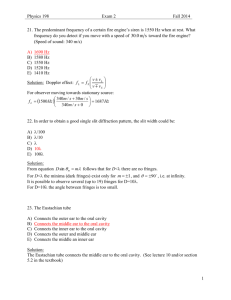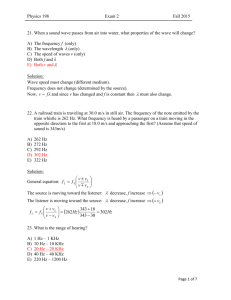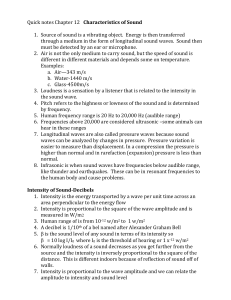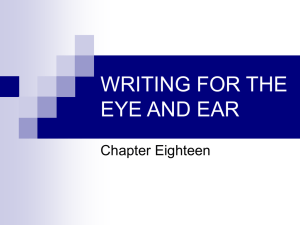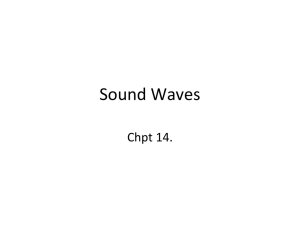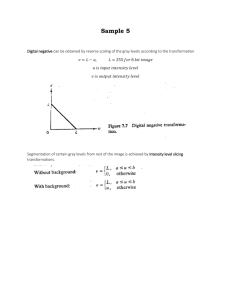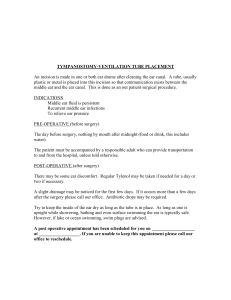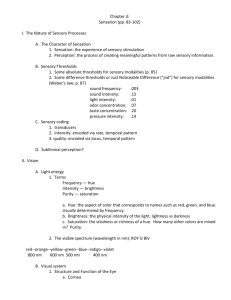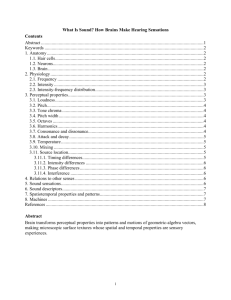Strings & tubes (symmetric)
advertisement
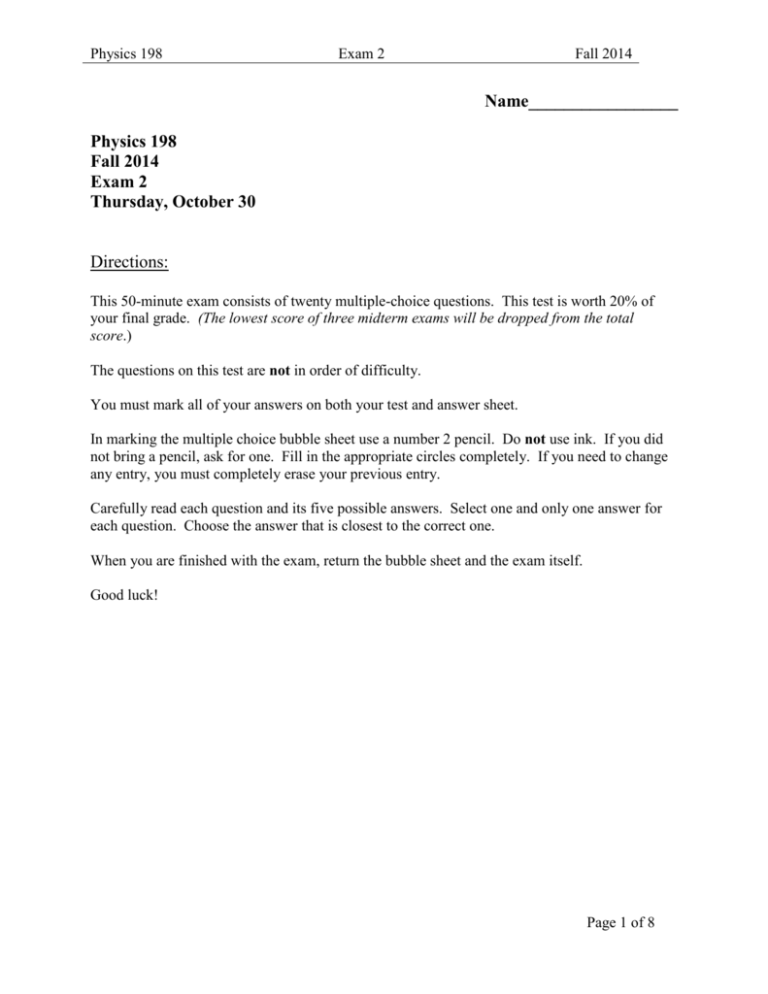
Physics 198 Exam 2 Fall 2014 Name_________________ Physics 198 Fall 2014 Exam 2 Thursday, October 30 Directions: This 50-minute exam consists of twenty multiple-choice questions. This test is worth 20% of your final grade. (The lowest score of three midterm exams will be dropped from the total score.) The questions on this test are not in order of difficulty. You must mark all of your answers on both your test and answer sheet. In marking the multiple choice bubble sheet use a number 2 pencil. Do not use ink. If you did not bring a pencil, ask for one. Fill in the appropriate circles completely. If you need to change any entry, you must completely erase your previous entry. Carefully read each question and its five possible answers. Select one and only one answer for each question. Choose the answer that is closest to the correct one. When you are finished with the exam, return the bubble sheet and the exam itself. Good luck! Page 1 of 8 Physics 198 Exam 2 Fall 2014 21. The predominant frequency of a certain fire engine’s siren is 1550 Hz when at rest. What frequency do you detect if you move with a speed of 30.0 m s toward the fire engine? (Speed of sound: 340 m/s) A) B) C) D) E) 1690 Hz 1580 Hz 1550 Hz 1520 Hz 1410 Hz 22. In order to obtain a good single slit diffraction pattern, the slit width could be: A) B) C) D) E) /100 /10 10 100 23. The Eustachian tube A) B) C) D) E) Connects the outer ear to the oral cavity Connects the middle ear to the oral cavity Connects the inner ear to the oral cavity Connects the outer and middle ear Connects the middle an inner ear 24. At low frequencies (below 1000 Hz) localization of sound is possible due to what factor? A) B) C) D) E) Time difference between sound traveling to two ears The intensity difference at two ears (shadow effect) Reflection from surrounding objects Harmonics decomposition Localization is impossible at these frequencies 25. According to the Fechner law sensation is what function of stimulus? A) B) C) D) E) Linear Quadratic Harmonic Logarithmic Exponential Page 2 of 8 Physics 198 Exam 2 Fall 2014 26. What equation is correct? A) B) C) D) E) log( 400) 2 2 log 2 log( 400) 3 log 3 log( 400) 4 log 3 log( 400) 4 log 2 log( 400) 6 log 2 27. A source of a 500 Hz sound is operated at a power of 60 microwatts. The sound radiates with equal intensity in all directions. What is the intensity level 50 m from the source? A) B) C) D) E) 82 dB 70 dB 65 dB 41 dB 33 dB 28. Suppose that a single violin gives an average sound intensity level of 70 dB at a seat in the audience. Now suppose that 2 violins play the same piece in the same way. What average sound intensity level would you expect at the same seat in the audience? A) B) C) D) E) 70 dB 73 dB 76 dB 79 dB 82 dB 29. Suppose that a single violin gives an average sound intensity level of 70 dB at a seat in the audience that is L meters from the violin. What average sound intensity level would you expect at a seat that is L/2 meters from the violin? A) B) C) D) E) 70 dB 73 dB 76 dB 79 dB 82 dB 30. If two sounds differ by 20 dB, what is the ratio of their intensities? A) B) C) D) E) 2 10 20 log20 100 Page 3 of 8 Physics 198 Exam 2 Fall 2014 31. What part of the ear is mainly responsible for critical band and for jnd (just-noticeable difference) A) B) C) D) E) Outer ear Middle ear Eustachian tube Basilar membrane Semi-circular canals 32. What statement is wrong? A) B) C) D) E) Pitch increase with sound level for high frequencies Pitch decrease with sound level for low frequencies Pitch shows little changes for middle frequencies (~2000Hz) Pitch decrease with sound level for high frequencies Pitch depends on duration and on envelope of sound 33. What is virtual pitch? A) B) C) D) E) Second harmonic Missing fundamental The lowest frequency in the spectrum The highest frequency in the spectrum None of the above 34. Pure tones of 440 Hz and 600 Hz are sounded together. What is frequency of beats? A) B) C) D) E) 600 Hz 440 Hz 160 Hz 80 Hz None of the above 35. What frequency ratio gives an interval that is exactly 1/12 of an octave? A) B) C) D) E) 1/6 1/7 1/12 21 12 21 6 Page 4 of 8 Physics 198 Exam 2 Fall 2014 36. What ratio has minor third in equal temperament? 4 A) 21 / 12 21 / 3 1.26 B) 5 : 4 1.25 3 C) 21 / 12 21 / 4 1.19 D) 6 : 5 1.2 E) 3:2=1.5 37. How many octaves have 12 perfect fifth? A) B) C) D) E) 5 6 7 8 9 38. In Pythagorean scale what is the ratio of F and C frequencies ( f F f C )? A) B) C) D) E) 4/3 3/2 9/8 256/243 None of the above 39. Just intonation is based on major triads with frequency ratios: A) B) C) D) E) 1:2:3 4:5:6 7:8:9 1:3/2:2 1:5/4:2 40. Which scale has a circle of fifths that closes exactly? A) B) C) D) E) The equal temperament scale The Pythagorean scale The just intonation scale The mean tone intonation scale None of the above Page 5 of 8 Physics 198 Exam 2 One Dimensional motion Average Velocity: v x / t Instantaneous Velocity: v lim x / t t 0 Average acceleration: a v / t Instantaneous acceleration: a lim v / t t 0 For constant acceleration only a v / t x x0 v0 x t 12 a x t 2 v x v0 x a x t y y 0 v 0 y t 12 gt 2 v x v0 x v y v 0 y gt g 9.80 m / s 2 (String) v 331.3 0.6t m / s (For air) r2 r1 n constructive r2 r1 n 12 destructive Strings & tubes (fixed /closed at one end) n 1,3,5... Newton’s Laws, Forces F ma FAB FBA F kx Waves v f T F m ; v L Strings & tubes (symmetric) n 1,2,3... 2L n n L n 2 n v nv fn nf1 n 2 L Projectile motion x x0 v0 x t F mg Fall 2014 n n 4 fn (Gravity) (Spring) L n v n 4L n nv nf 1 4L Reflection 1 2 sin 2 v2 2 Refraction sin 1 v1 1 Work, Energy W Fd cos K 12 mv 2 U mgh (Gravity) 2 1 U 2 kx (Spring) Doppler Effect v vL f L f S v vS Oscillations 2 2f T x A cos(t ) v A sin( t ) a A 2 cos(t ) f 1 2 k 1 ; f m 2 g v a ; f l 2 Vl Page 6 of 8 Physics 198 Exam 2 Logarithms 10b c b log 10 c log c log AB log A log B log A / B log A log B Fall 2014 Equal temperament Semitone ratio: 21 12 1.05946 Whole tone ratio: 2 1 / 12 2 21 6 1.12246 1.05946 2 log An n log A log 1 0 log 2 0.301 log 10 1 P A Area of sphere: A 4r 2 Intensity: I Decibels LP 10dB log P ; P0 10 12 W P0 I LI 10dB log ; I 0 10 12 W / m 2 I0 p L pr 20dB log ; p0 2 10 5 N / m 2 p0 I nI1 LI 1 10dB log n I 2 I1 LI 1 10dB log 2 LI 1 3dB I 10 LI 10dB I0 Beats: fbeats f 2 f1 Consonant intervals f2:f1 Interval’s name Examples #of half steps 1:1 unison (C, C) 0 2:1 octave (C, C) 12 3:2 perfect fifth (C, G) 7 4:3 perfect fourth (C, F) 5 5:3 major six (C, A) 9 5:4 major third (C, E) 4 8:5 minor six (C, Ab) 8 6:5 minor third (C, Eb) 3 Page 7 of 8 Physics 198 Exam 2 Fall 2014 Record Sheet You may fill in this sheet with your choices, detach it and take it with you after the exam for comparison with the posted answers 1 11 2 12 3 13 4 14 5 15 6 16 7 17 8 18 9 19 10 20 Page 8 of 8
